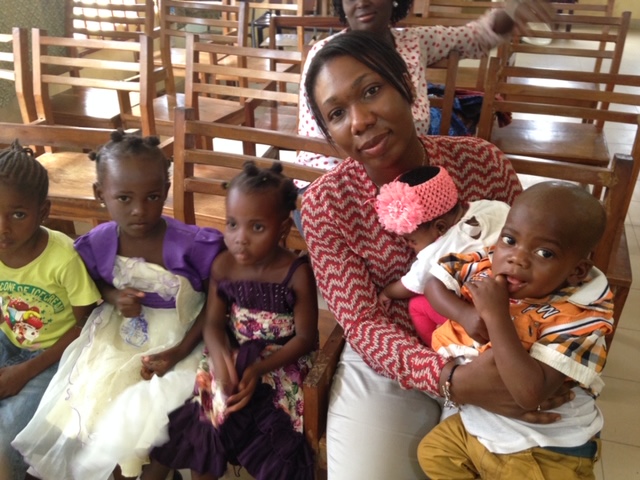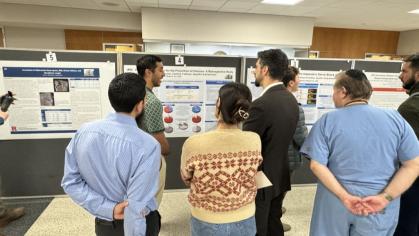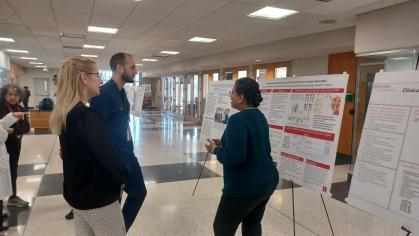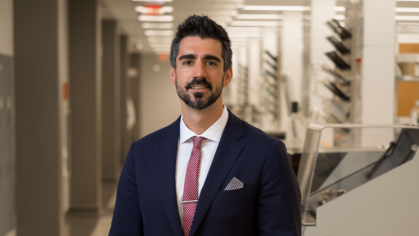RSDM Researcher Advocates for Pediatric Health in Africa
 Dr. Modupe Coker with children she works with as part of her research in sub-Saharan Africa
Dr. Modupe Coker with children she works with as part of her research in sub-Saharan Africa
Twice a year since 2013, Dr. Modupe Coker has been travelling to Nigeria for clinical research on HIV and its connection to dental caries, which she views as a window into learning more about the disease.
Central to her work has been studying a cohort of over 500 children and their HIV-infected mothers to gauge the diseases’ effect on oral health and gather genetic information.
When COVID-19 reached the nation, her trips were suspended. She began to worry about the children in her group and how they were weathering lockdowns and quarantines. “I’m very passionate about them and concerned about their overall health,” said Coker, an epidemiologist whose research career began with her work as a dentist.
Although children account for a relatively small number of documented COVID-19 cases and fatalities in sub-Saharan Africa, the disease has had a wide-ranging impact on pediatric health. It’s a region where children already account for a disproportionate amount of the world’s communicable and non-communicable diseases, says Coker, who is from Nigeria.
“Most children living in these areas are disadvantaged and at this rate, they’re going to lose a lot more due to COVID-19,’’ she said. “I’m an African advocate by heart. I push an agenda for Africa in everything I do. We should not forget about the children in Africa.”
Coker collaborated with an international group of colleagues on a paper published in “Pediatric Research” last month titled, “Things Must Not Fall Apart: The Ripple Effects of the COVID-19 Pandemic in sub-Saharan Africa.’’ The title was inspired by author Chinua Achebe, a widely acclaimed Nigerian poet and novelist.
The paper explores how COVID-19 is undermining children’s health in nations that struggle to mitigate the rate of other diseases and illnesses. Sub-Saharan Africa accounts for 93 percent of the world’s malaria cases. Children in Africa comprise 24 percent of pediatric tuberculosis patients. They also account for 90 percent of all children under 15 living with HIV, with only 52 percent having access to treatment. Malnutrition rates in the region account for 23 percent of cases worldwide. Vaccination regimes and other treatment programs have largely been halted by the pandemic.
Diets are impaired by parents losing jobs or livelihoods and shuttered schools, which many children relied upon for meals. “My team has been observing in weight loss in some of the kids enrolled in our cohort,’’ said Coker. Sociological problems, like domestic violence are also on the rise, just as they have been in other nations. The impact of COVID will be felt for many years to come. But Coker and her collaborators have recommended measures to repair some of the damage.
Plans include better data collection so that the true number of COVID cases and deaths among adults and children can be documented, since many are undercounted, and the inclusion of children in clinical trails for COVID-19. They also advocate for better data collection to measure how COVID has affected other aspects of pediatric health. High risk children, such as those with malnutrition and HIV, who are more susceptible to COVID and other illnesses, should be given priority for treatment and prevention of the coronavirus.
Teleheath efforts should be ramped up to offer medical treatment and support for sociological and mental health problems, while expanded access to housing and legal protection should be instituted, according to the paper.
In addition to the strengths of African culture, which is deeply rooted in resilient optimism and community pride, Coker and others see reason for hope. “Public health responses to the pandemic in sub-Saharan African countries are evolving…The pandemic presents an opportunity to accelerate both targeted testing and treatment centers and comprehensive cross-cutting action, e.g. social support, policy changes and new funding streams,'' according to the paper.
"The changes should focus on only on WHAT can be done, but also on HOW to do things differently for sustainable impact in these rapidly changing circumstances,'' Coker and her colleagues recommend. "Even as the COVID-19 pandemic continues, things should not fall apart for children in sub-Saharan Africa.’’



